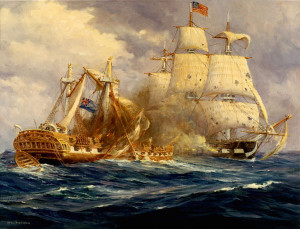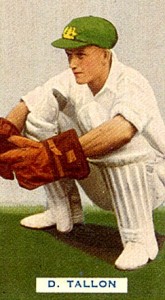A little while back I attended a course on editing Wikipedia. While not an avid user of the online resource, I do find it useful. It’s excellent for popular culture (mainly of the quiz questions variety); where else can you quickly discover what a Vorlon is? Or what Richard Gere’s middle name is? Or a list of the Eurovision song winners and the points they scored? It’s increasingly useful for place names, historical events and planning of anniversaries and celebrations. I particularly like using Wikipedia for place names as there is a useful link to the Ordnance Survey maps. Wikipedia also provides links to VIAF (and other authority files) which I use for creating person authority files in BBIH.

Painting by Anton Otto Fischer depicting the first victory at sea by USS Constitution over HMS Guerriere.
The best part of the course was the fascinating introduction by Andrew Gray. He described how Wikipedia had developed, its ethos and aims, all to the accompaniment of real-time editing changes being screened in the background.
The training was less successful, not I hasten to add because of the tutor but because of the technology. The Mac notebooks used by the library are not geared up for teaching purposes (the screens are too small and the short cuts I’m used to did not seem to work, at least on my notebook) which meant endless scrolling up and down. The session wasn’t helped by my need for glasses to see the notebook and then take them off to see the overhead screen.
To my surprise the editing format is a little clunky and a bit old-fashioned. I initially made a few miserable and desultory attempts to edit something (and failed). The original idea I had of adding snippets of information and fleshing out some short articles has not come to fruition. I thought it would be easy to dip in and out of articles and edit accordingly while doing my “day job”. I’m afraid it all became too frustrating and irritating. I did spend one determined weekend augmenting some articles and was a little more successful but it was a chore and although I managed most of what I set out to do I don’t think I’ll ever truly master the editing. Happily Wikipedia are developing a better user interface. Perhaps I’ll give it another go!
Enough moaning about my inadequacies and to the real point of this posting – two articles, unsurprisingly, about Wikipedia.
The first featured in a special edition of the Journal of Military History1. The article, by Richard Jensen, examines how the 14,000-word article on the “War of 1812” was worked on by over 2,000 different people, with no overall coordinator or plan. Debates raged as the 1812 article attracted over 3,300 comments by 627 of the most active editors. Interestingly the main dispute in the Wikipedia entry was who actually won the war. Jensen also looks at the sources used by the Wikipedia editors, which mainly rest upon free online sources and popular books, rather than scholarly monographs and articles.
The second article, Wicked Wikipedia? Communities of Practice, the Production of Knowledge and Australian Sport History by Stephen Townsend2 et al, analysed 115 Wikipedia articles written about notable Australian sportspeople, revealing a disproportionately large group of high-quality cricket biographies. Upon further investigation it was discovered that a small group of Wikipedians were responsible for writing these articles, showing the influence that dedicated special interest groups can have over the production of knowledge on Wikipedia.
Increasingly Wikipedia is being cited in learned and academic books and journals. From anecdotal evidence I’ve come across a review for The Freedom of Speech: The history of an idea, in which the reviewer notes that the introduction contains three referrals to Wikipedia for recent events3.
In Engineers of victory : the problem solvers who turned the tide in the Second World War by Paul Kennedy, the author cites Wikipedia, arguing that for some of his topics he finds that Wikipedia is the best source or one of the best; he is particularly impressed by the articles on the Pacific War. He has 11 Wikipedia pages listed in the digital resources section of his bibliography, and the endnotes refer to a number of pages in very approving terms,though does admit to some which are embarrassing to peruse.
Furthermore, in Norman Davies’ Vanished Kingdoms: The History of half-forgotten Europe, the author offers a robust defence of Wikipedia comparing the entry for Burgundy to, “…old-fashioned printed reference works”. As Davies states, “Analytical studies have shown that Wikipedia, for all its faults, can sometimes match the most prestigious academic brands. It has the virtue of being constantly corrected and updated” 4. One can see his sources using Wikipedia, and other online resources, in his footnotes for Eire5.
Some data scientists and analysts also use Wikipedia to assess rankings of significant people including historical figures. Wikipedia is one of the data sources used, by analysing the pages of more than 800,000 people to measure quantities that should correspond to historical significance. They expect that more significant people will have longer Wikipedia pages than those less notable. Also the Wiki pages of people of higher significance should attract greater readership than those of lower significance.
I’d be interested to know of any other anecdotal evidence or indeed any other articles that have analysed history on Wikipedia.
Also readers might be interested in Andrew Dalby’s The world and Wikipedia: how we are editing reality.
1 Journal of Military History, vol. 76:4, 2012
2 The International Journal of the History of Sport, vol. 30:5, 2013 p. 545-59
3 McMenemy, Paul. Journal for Eighteenth Century Studies, 36:2 2013 p. 312-13
4 Davies, p. 143-149
5 Davies, p. 728-4

